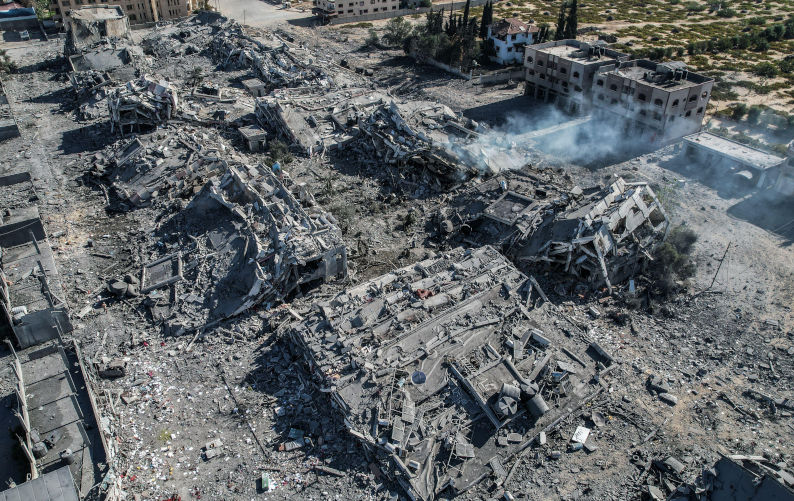Our foreign minister’s first and hardest overseas task in 2024 is likely to be her visit to Israel. Penny Wong and other foreigners, apart from aid workers, cannot enter Gaza. This will circumscribe what she sees, whom she meets, and what she achieves.
If Anthony Albanese follows her visit to Israel, the Coalition and the Murdoch media will for once not criticise him for travelling. They will be delighted, as will Australia’s Jewish lobby groups.
But only if the foreign minister and prime minister meet leaders in, say, Egypt, Iraq, Jordan, Lebanon, Saudia Arabia, Syria, and Yemen will they hear other reactions to the Gaza war than Israel’s ‘whatever it takes’, and the US ‘please, arm but restrain’ positions. If the scare-quotes are to drop off Australia’s ‘independent’ foreign policy, Wong and Albanese will need to see, listen and talk.
It’s time they did. The ruling of the International Court of Justice (ICJ) on the Genocide Convention and its application to Israel should be known by then. Now, the split across the Middle East between Israel and the Arab states, always there since 1947, and occasionally patched up, divides Israelis and Palestinians as never before, and in many countries.
Since 7 October 2023, much of the world has taken sides over 1200 Israelis killed by Hamas and 230 taken hostage, versus 23000 Palestinians killed by the IDF and some 5000 Palestinian political prisoners in Israel. A few have been released by both sides.
A similar gap yawns between Palestinians and those Israelis who claim the right to their God-given land. They believe that the Jews’ historic, exclusive, experience of genocide divides them from others (including Arab Jews) who see modern invasion, expulsion, apartheid, and genocide being perpetrated by the successors of Holocaust victims who should least want it repeated.
Several countries have backed South Africa – with its experience of apartheid – in accusing Israelis of genocide in Gaza. South Africa’s application to the ICJ will be heard this week. Experienced international lawyers spent October to December drafting South Africa’s 84-page document. While it acknowledges that Hamas was responsible for the atrocious war crimes against civilians in southern Israel on 7 October, the document denies that those events justify what Israel has done since then. With careful legal arguments and supporting evidence, it cites Israeli leaders’ statements and the behaviour of the IDF to allege that Israel is committing genocide against all the Palestinians in Gaza.
Netanyahu has appointed an 87 year-old former Supreme Court President, Aharon Barak, with a record of supporting occupation of Palestinian land, to represent Israel at the Hague. If the ICJ, which has ruled against Israel in the past, determines that genocide is happening, then the International Criminal Court must consider who is responsible.
Some of Israel’s friends have pre-empted the outcome. White House National Security Council spokesperson John Kirby dismissed South Africa’s case as ‘meritless, counterproductive, and completely without any basis in fact’. Former UK Prime Minister Boris Johnson said a Metropolitan Police investigation into Israel’s war crimes represented ‘worrying politicisation’ of the police force. In December, the governments of Australia, Canada, and New Zealand called in December on Israel and Hamas for a ‘sustainable ceasefire’. This was a step towards what former foreign ministers Gareth Evans and Bob Carr did, demanding a permanent ceasefire, the release of hostages, and Australian diplomatic recognition of the state of Palestine. They have since been joined by some 317 Australian political leaders. The politicians’ letter urges Australia to join 139 nations in recognising the state of Palestine – which is ALP policy.
Before that happens, we can assume that a gap between Penny Wong and Richard Marles will need to be bridged. Their policy difference over Palestine mirrors the division in Australia between pro-Israel and pro-Palestinian groups on what are essentially identity, territorial, and humanitarian issues, which spill over, via mainstream media, into State and Federal politics, and international relations.
What’s not yet raised its ugly head in Australia is the identification of Palestine supporters as Nazis. This accusation comes from descendants of the Jewish people whom the German Nazis sought to exterminate, who are now making the victims the perpetrators and vice versa. ‘Arab Nazis’ is the term for Palestinians circulating among ultra-conservative leaders in Germany, Poland, Hungary, and Lithuania, who cite their nations’ experience of Islamist terrorism and Muslim refugees from the Middle East. Even Elon Musk says on visits to Israel that he is fighting the ‘new Nazis’ in Gaza to save Western civilisation.
Predatory settlers in the West Bank include young men, recently armed by Israel’s national security, and led by the belief that Palestinians must be expelled or killed, in order to install a theocratic state. This, despite the Old Testament commandment to love thy neighbour as thyself, and respect the stranger in thy midst, is ethnic cleansing. What’s happening in Gaza is a second Nakba, but now the perpetrator of genocide is cast as the victim (David Shulman, ‘A bitter season in the West Bank’, NYRB, 21 December 2023).
The ideological split has now divided universities, where free expression used to be cherished. Harvard’s president has been sacked by a Board whose loyalties to Israel and finance may be greater than its dedication to black female intellectuals. Similar experiences have occurred in Australia, where Sydney University sacked Tim Anderson for expressing anti-Jewish views, and in the UK, according to Exeter University’s Professor Ilan Pappé. Labour’s Jeremy Corbyn lost the party’s leadership over accusations of anti-semitism.
What our foreign minister and prime minister have to decide before they visit Israel is whether Australia joins the US and a handful of states whose views oppose the UN Charter, the UN Declaration of Human Rights, and the Genocide Convention. They should consider what that means about the ‘shared values’ that underpin our alliance.
Dr Alison Broinowski AM is a former Australian diplomat and a member of Australians fr War Powers Reform

